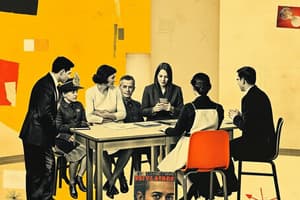Podcast
Questions and Answers
Two or more people that come together to achieve a common goal
Two or more people that come together to achieve a common goal
Group
A group that shares intimate and personal relationship
A group that shares intimate and personal relationship
Primary group
A group that is impersonal with temporal relationship that are goal or task oriented
A group that is impersonal with temporal relationship that are goal or task oriented
Secondary group
Expectation of group members
Expectation of group members
Characteristics of small groups
Characteristics of small groups
Stages of group formation-Forming stage
Stages of group formation-Forming stage
Storming stage
Storming stage
Norming
Norming
Brainstorming
Brainstorming
Performing Stage
Performing Stage
Adjorning
Adjorning
Characteristics of effective group
Characteristics of effective group
Problems that arise in group
Problems that arise in group
Group think
Group think
A type of contribution needed to achieve a group goal
A type of contribution needed to achieve a group goal
Task function
Task function
Maintenance function
Maintenance function
Non functional roles
Non functional roles
Leadership style
Leadership style
Types of leader
Types of leader
Role of a leader
Role of a leader
Flashcards are hidden until you start studying




